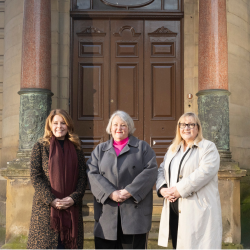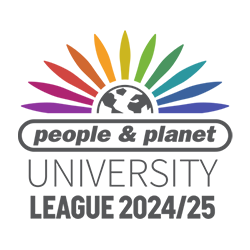-
Study
-
Undergraduate
- Search for a Course
- Undergraduate Open Day & Events
- Application Guides
- Northumbria University UCAS Exhibitions
- Foundation Years
- Undergraduate Fees & Funding
- School & College Outreach
- Continuing Professional Development
-
Postgraduate
- Postgraduate Study Degree
- Postgraduate Research Degrees
- Postgraduate Open Days and Events
- Postgraduate Fees & Funding
- Flexible Learning
- Thinking about a Masters?
- Continuing Professional Development
- Change Direction
-
Student Life
- The Hub - Student Blog
- Accommodation
- Life in Newcastle
- Support for Students
- Careers
- Information for Parents
- Students' Union
- Northumbria Sport
- Be Part of It
-
-
International
International
Northumbria’s global footprint touches every continent across the world, through our global partnerships across 17 institutions in 10 countries, to our 277,000 strong alumni community and 150 recruitment partners – we prepare our students for the challenges of tomorrow. Discover more about how to join Northumbria’s global family or our partnerships.
View our Global Footprint-
Applying to Northumbria
- European Union
- Our London Campus
- Northumbria Pathway
- International Events
- Entry Requirement and Education Country Agents
- Global Offices
-
Northumbria Language Centre
- Faculty Requirements
- Acceptable English Requirements
- Pre-sessional English Language and Study Skills
- Academic Language Skills Programmes (ALS)
-
International Fees, Funding & Scholarships
- International Undergraduate Fees
- International Undergraduate Funding
- International Masters Fees
- International Masters Funding
- International Postgraduate Research Fees
- International Postgraduate Research Funding
- International Money Matters
-
Life at Northumbria
- International student support
- Careers
-
International Mobility
- Current Northumbria Students
- Incoming Exchange Students
-
-
Business
Business
The world is changing faster than ever before. The future is there to be won by organisations who find ways to turn today's possibilities into tomorrows competitive edge. In a connected world, collaboration can be the key to success.
More on our Business Services -
Research
Research
Northumbria is a research-rich, business-focused, professional university with a global reputation for academic quality. We conduct ground-breaking research that is responsive to the science & technology, health & well being, economic and social and arts & cultural needs for the communities
Discover more about our Research -
About Us
-
About Northumbria
- Our Strategy
- Our Staff
- Place and Partnerships
- Student Profiles
- Alumni Profiles
- Leadership & Governance
- Academic Departments
- University Services
- History of Northumbria
- Contact us
- Online Shop
-
-
Alumni
Alumni
Northumbria University is renowned for the calibre of its business-ready graduates. Our alumni network has over 246,000 graduates based in 178 countries worldwide in a range of sectors, our alumni are making a real impact on the world.
Our Alumni - Work For Us
What will I learn on this module?
This module aims to further develop your capabilities in the areas of digital systems by means of synthesizable register-transfer level (RTL) coding.
The module starts by introducing digital system design and an overview of Verilog language. You will learn the implementation of both sequential and combinational circuits using Verilog as well as the concept of testbench and will learn how to apply the concept of testbench to real-world problems and how to simulate the real devices and digital components in your testbench. Through examples, you also will learn about FSM and design hierarchy and the benefit of clean code in a project. Further sections continue with the common design techniques, such as synchronisation reset, ping-pong operation, and cross clock domain design.
You will also learn techniques and tools that help you with developing your RTL codes including:
1- Simulation
2- Debugging
3- FSM design tools
4- Available standard library
This part of the module comes with a set of workshops specifically arranged to teach you how to use designated tools for simulation and programming a FPGA device.
Another section of the module is devoted to programming FPGA using modern programming languages. You will start by understanding SoC architectures and available modern programming languages for FPGA. Then you will learn the fundamental requirements of using a modern programming language for FPGA programming such as commonly used keywords, libraries, packages, etc. The structure of the modern programming language is covered and its implementing is then explained through several examples and you learn how to apply your acquired knowledge to real world problems. You then will be briefly introduced to topics including digital signal processing (DSP), software defined radio (SDR), and their common and cutting-edge applications in daily life and industry.
How will I learn on this module?
The module will be delivered via a combination of lectures, directed and independent learning and practical workshops as well as asynchronous pre-recorded videos.
Lectures will be used to deliver the key concepts, knowledge and understanding of high-level technologies. Regular workshops will provide them with the vital practical experience required to support hardware design concepts and develop the skills the students will need to successfully complete the assignment.
How will I be supported academically on this module?
All taught materials will be provided on the eLearning platform, including workshop exercises, past exam questions and examples. You will also have access to pre-recorded video of all topics and workshops. You will be encouraged to ask questions and fully engage during all contact sessions, including workshops.
What will I be expected to read on this module?
All modules at Northumbria include a range of reading materials that students are expected to engage with. Online reading lists (provided after enrolment) give you access to your reading material for your modules. The Library works in partnership with your module tutors to ensure you have access to the material that you need.
What will I be expected to achieve?
Knowledge & Understanding:
1. Applying appropriate codes of practice and industry standards; knowledge of the use of high-level techniques, programmable logic development equipment, software packages, and simulation tools. (AHEP 4 M1, M3)
Intellectual / Professional skills & abilities:
2. Design, model, simulate, and implement a range of digital hardware sub-systems using high-level techniques. (AHEP 4 M5, M6)
Personal Values Attributes (Global / Cultural awareness, Ethics, Curiosity) (PVA):
3. Doing group work to develop teamwork skills and promote collaboration; using practical workshops skills to investigate complex problems; providing the opportunity to innovate and show creativity by granting design freedom and research requirement within a solution approach (AHEP 4 M5, M16);
4. Awareness of environmental effect from high-power processing units and digital systems assessed in CW3 (AHEP 4 M7)
How will I be assessed?
This module will be assessed as follows.
1- Coursework (CW): Project assignment 60% for LO1, LO2, LO3:
Here the students are asked to develop an high level code to program a FPGA device to deliver a list of specifications as the project requirements.
2- Coursework (CW): Lab report 40% for LO1, LO2, LO3, LO4:
The students are asked to write a report based on the lab sessions they had to show their level of understanding and skills related to practical aspect of the module.
Pre-requisite(s)
None
Co-requisite(s)
None
Module abstract
In this module you will acquire knowledge of designing digital systems using hardware description language (HDL). The module introduces digital logic design using Verilog hardware description language for FPGA chips. You will learn essential register-transfer level (RTL) coding skills to build synthesizable logic circuit. Both combinational and sequential circuits will be covered and commonly used digital blocks such as multiplexer, demultiplexer, counter, shift register, memory block, etc will be created using RTL coding. The industry standard tools will be used to facilitate design, verification, and implementation of the synthesizable codes. You will also learn the benefit of using testbench, IP, and timing analysis to enhance the development procedure and efficiency. Additionally, you will be introduced to program FPGA using modern programming languages. The concept of System on Chip (SoC) is covered, and you will learn the fundamentals of a modern programming language to program the FPGA device. The module also looks at finite state machine (FSM) and its RTL implementation as well as the concept of hierarchical design and clean code. Both RTL and modern programming language lectures will be accompanied by designated workshop to give you the hands-on experience and knowledge of practical work.
Course info
Credits 20
Level of Study Postgraduate
Mode of Study 2 years Full Time (with Advanced Practice in the second year)
2 other options available
Department Mathematics, Physics and Electrical Engineering
Location City Campus, Northumbria University
City Newcastle
All information is accurate at the time of sharing.
Full time Courses are primarily delivered via on-campus face to face learning but could include elements of online learning. Most courses run as planned and as promoted on our website and via our marketing materials, but if there are any substantial changes (as determined by the Competition and Markets Authority) to a course or there is the potential that course may be withdrawn, we will notify all affected applicants as soon as possible with advice and guidance regarding their options. It is also important to be aware that optional modules listed on course pages may be subject to change depending on uptake numbers each year.
Contact time is subject to increase or decrease in line with possible restrictions imposed by the government or the University in the interest of maintaining the health and safety and wellbeing of students, staff, and visitors if this is deemed necessary in future.
Useful Links
Find out about our distinctive approach at
www.northumbria.ac.uk/exp
Admissions Terms and Conditions
northumbria.ac.uk/terms
Fees and Funding
northumbria.ac.uk/fees
Admissions Policy
northumbria.ac.uk/adpolicy
Admissions Complaints Policy
northumbria.ac.uk/complaints














